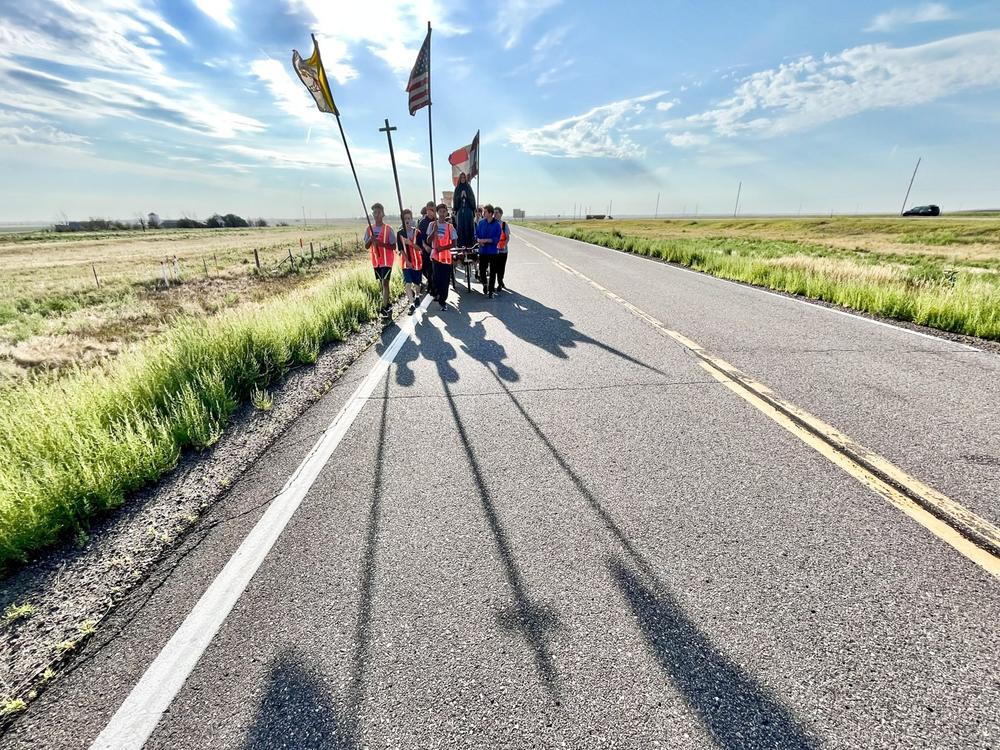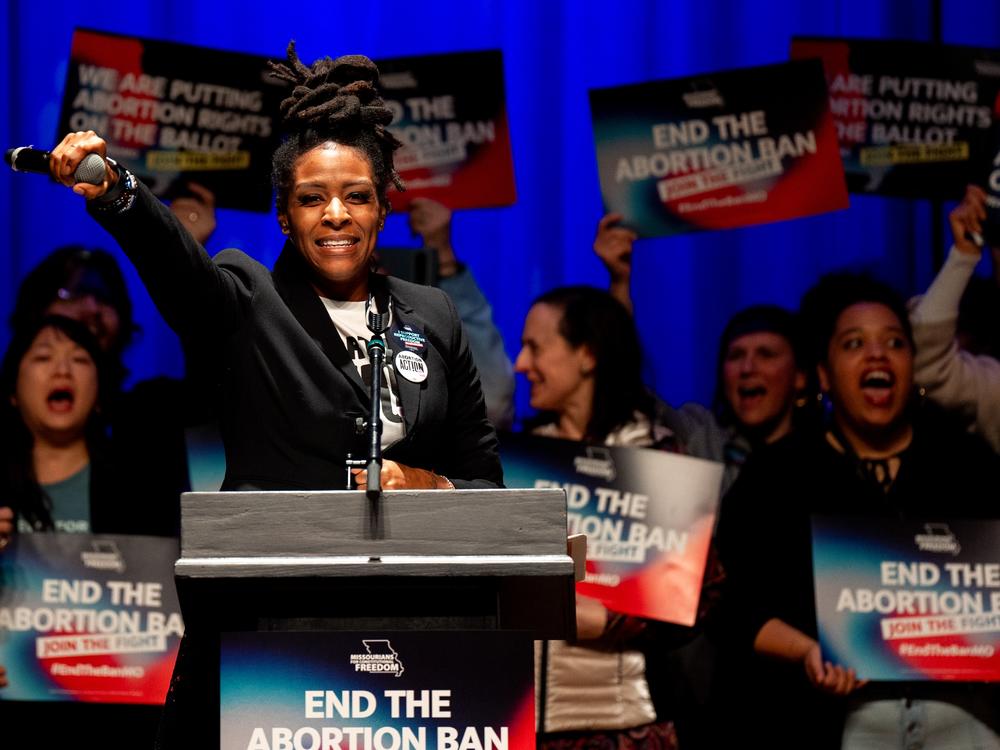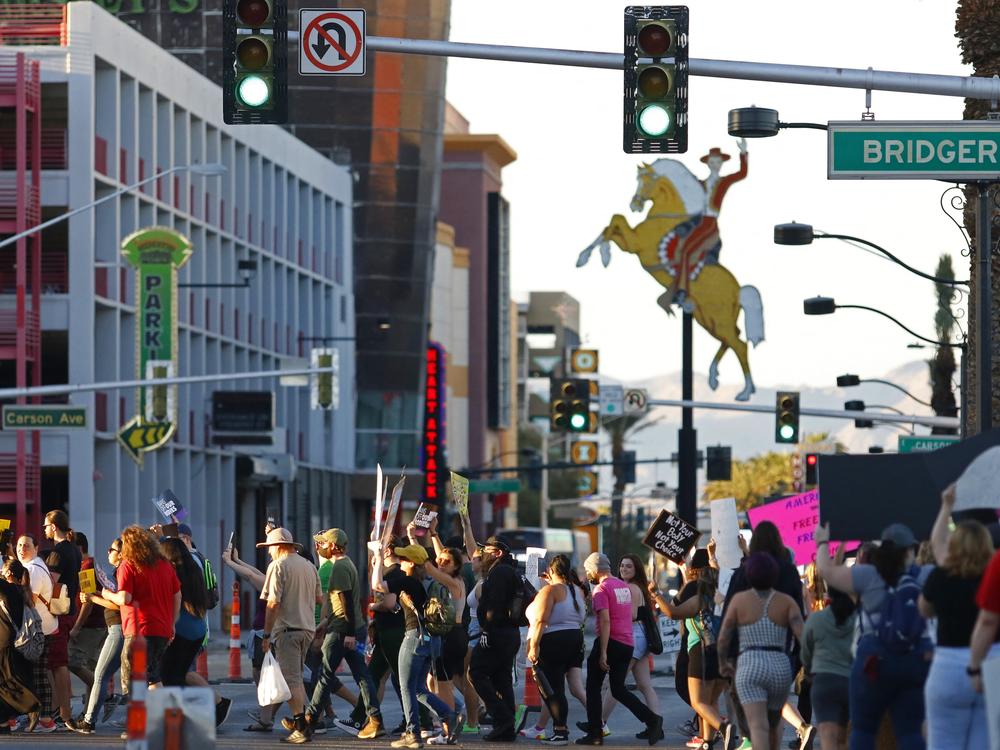Section Branding
Header Content
The abortion debate is headed to the ballot box. Here's where voters will decide
Primary Content
Since the U.S. Supreme Court overturned the federal right to abortion in 2022, states have had the final say on abortion rights. And now abortion-rights supporters across the United States seek to maneuver around Republican-led legislatures and go straight to voters.
Loading...
This year, voters in up to 10 states could face abortion-rights amendments. Several states that outlaw most abortions could see those bans reversed if the ballot measures pass: Arkansas, Florida, Missouri, Nebraska and South Dakota.
Voters have already backed abortion rights at the ballot box in at least six states since the reversal of Roe v. Wade, including conservative-leaning Kentucky and Kansas.
Getting amendments on the ballot takes legwork, gathering tens or hundreds of thousands of signatures. Then, there could be court challenges.
The statewide up-or-down votes could motivate more voters to the polls, shaping the race for president, the battle for which party controls Congress and, in Arizona for example, which party runs the legislature.
NPR is tracking the amendment campaigns taking place across the country and will update the developments through November.
Colorado
Colorado doesn’t restrict abortion at any time during pregnancy. That has led to the state becoming a regional hub for abortion access.
Coloradans did use the ballot to impose one limit in 1984, when they passed a constitutional amendment banning public funding for abortions.
Now, abortion-rights advocates have gotten a proposed amendment on the ballot to guarantee a right to abortion in the state constitution, which would prohibit any laws impeding that right.
The amendment would also remove that current constitutional ban against public funding for abortions — in Medicaid or state employee health plans. The initiative is similar to the state law passed in 2022. It would need 55% of the vote to get into the constitution.
For more, visit Colorado Public Radio.
Florida
Florida is the most populous state where abortion-rights advocates already have enough signatures and the official approval to put a question on the ballot this November. The state will ask voters whether to protect abortion in the state constitution up to the point of fetal viability — usually about 24 weeks of pregnancy — or, in all cases, to protect the life of the pregnant person.
The state’s six-week abortion ban, which has exceptions for rare circumstances, went into effect in May, further energizing voters on both sides of the issue to come out in November. And Florida requires 60% approval to pass the amendment, a level no other state has met since Roe v. Wade’s reversal in 2022.
For more, visit WFSU.
Maryland
Since taking office in 2023, Democratic Gov. Wes Moore has billed Maryland as a “sanctuary state” for reproductive rights. Moore’s administration stockpiled mifepristone — one of two drugs used in medication abortion — when federal court cases threatened the drug’s future, and it has put money into training more health care workers in reproductive care.
In November, Maryland voters will decide on an amendment that would enshrine reproductive rights in the state constitution. The amendment would protect “the ability to make and effectuate decisions to prevent, continue, or end one’s own pregnancy.” The referendum needs a simple majority to pass and is expected to meet that threshold.
Meanwhile, during the legislative session this year, Maryland lawmakers put money aside to help facilities that provide abortions improve security.
For more, visit WYPR.
South Dakota
A group known as Dakotans for Health has submitted 55,000 signatures of voters asking for a question on the ballot that could enshrine abortion protections into the state constitution.
After the Dobbs decision ended the federal right to abortion, an already-in-place South Dakota law went into effect banning all abortions except to save the life of the mother — though critics say that this exception remains undefined.
The proposed amendment would allow abortions in the first trimester, add more restrictions in the second and prohibit abortions in the third trimester, with some exceptions.
Some abortion-rights groups say the amendment is too weak, while an anti-abortion group has called it “extreme.”
For more, visit South Dakota Public Broadcasting.
Arizona
Arizona took a confusing turn this spring when a court ruled that a near-total ban on abortions, from a law that had been dormant for decades, could be enforced again. But the Legislature and courts have nullified that law, and the state’s ban on abortions after the 15th week of pregnancy is still in effect.
Now a proposed constitutional amendment would protect abortion rights until the point of fetal viability, or around 24 weeks. The ballot measure would also allow exceptions later in pregnancy when health risks are involved.
Organizers need to gather 383,923 signatures ahead of a July 3 deadline. They say they've already collected more than 500,000.
For more, visit KJZZ.
Arkansas
Arkansas' ban on abortion is one of the most restrictive in the country, making an exception only to save the life of the mother. One group, Arkansans for Limited Government, is working to legalize abortion, but that’s a tall order in a state with many more registered Republicans than Democrats.
The group needs to collect at least 90,000 signatures by July 5. If the proposed amendment makes it onto the ballot and more than half of voters approve it, it wouldn’t make abortion legal in every case: The amendment raises the cutoff date to the 18th week of pregnancy.
Some abortion-rights groups, like Planned Parenthood, have backed off supporting the effort, saying it doesn’t go far enough to make abortion more accessible.
For more, visit Little Rock Public Radio.
Missouri
Missouri’s abortion-rights advocates have collected far more than enough signatures to place a constitutional amendment protecting abortion on the 2024 ballot. The measure would undo the state’s law banning all abortions, except to save the life of the pregnant person, and replace it with language making abortion legal up to the point of fetal viability.
The ballot initiative is receiving significant financial support from out-of-state groups, as well as more volunteer support than any other proposed amendment in the state.
To curb the amendment effort, Republican lawmakers tried to get a separate ballot measure to voters that would have made it more difficult to amend the state constitution. However, using the longest filibuster in state history, Democrats overpowered that attempt.
For more, visit St. Louis Public Radio.
Montana
The proposed ballot measure in Montana would add language protecting abortion access up until fetal viability — around 24 weeks of pregnancy — to the state constitution during a referendum in November. The initiative’s supporters face a June 21 deadline to collect 60,000 signatures from across the state to qualify for the ballot.
Abortion remains legal and accessible in the state. That’s even though Republican lawmakers have passed several restrictive abortion laws at the request of GOP Gov. Greg Gianforte in recent years. Abortion rights are protected under state judicial precedent.
In 1999, the Montana Supreme Court ruled that the state’s constitutional right to privacy protects access to abortion until the point of viability. The court has reaffirmed the ruling in recent years.
For more, visit Montana Public Radio.
Nebraska
In 2023, the Legislature banned abortion after 12 weeks of pregnancy, down from 20 weeks previously. There are exceptions for rape, incest and the life of the pregnant patient. Medicaid and private health insurance plans are banned from covering most abortions.
Now two competing amendment drives are aiming for November. Abortion-rights groups propose asking voters whether they want to guarantee abortion access until fetal viability — usually around 24 weeks of pregnancy — and when needed to “protect the life or health of the pregnant patient.” Meanwhile, another group has started a petition drive to place the state's 12-week ban into the constitution.
They have until July 3 to gather just under 123,000 signatures. If they both make it onto the ballot and pass, whichever initiative gets more supportive votes will go into the constitution.
For more, visit Nebraska Public Media.
Nevada
Under a state law approved by voters in 1990, abortion is legal in Nevada within the first 24 weeks of pregnancy. Abortion-rights advocates want to put that in the state constitution with an amendment guaranteeing abortion access up until fetal viability, which is usually about 24 weeks.
Supporters need to gather 102,000 signatures by a June deadline. Nevadans for Reproductive Freedom says it has already gathered 200,000. For the amendment to take effect, voters would have to approve the initiative twice, once in 2024 and again in 2026.
Polling has consistently shown that roughly two-thirds of Nevadans believe access to abortion should be legal in “all or most cases.”
Nevada Democrats believe protecting abortion access mobilized voters during the 2022 midterm elections, and they plan to make the issue central to their cause this year, with a U.S. Senate seat and congressional seats at stake.
For more, visit Nevada Public Radio.
NPR’s Ryland Barton, Larry Kaplow, Barbara Sprunt and Acacia Squires edited this project. Design and development by Hilary Fung. Copy editing by Preeti Aroon.




